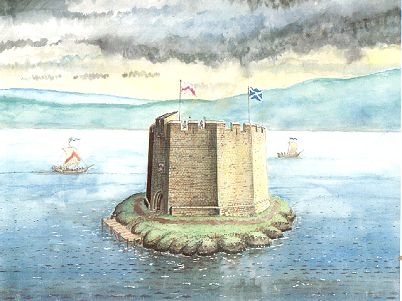
Loch Doon Castle

This rather odd looking castle originally sat on an island on Loch Doon and must have been almost impossible to besiege. Not because of its strong walls but because of its position on such a deep wide Loch. No causeway could be built out to it to convey siege towers. No land based mangonels or trebuchets (giant catapults which hurled rocks and fireballs) could hope to reach its walls. So all assaults would have to be by boat ,a very risky business.
However besieged it was in 1306,when Sir Christopher Seton, a follower and brother-in-law of King Robert the Bruce (1306-1329) ,fled here after the defeat of Bruce at the battle of Methven. The castle was held by the hereditary Governor Sir Gilbert de Carrick, who fearing Bruce to be a lost cause surrendered to the English without even trying to fight. Sir Christopher was taken prisoner to Dumfries and hanged as a traitor, while Sir Gilbert escaped with his life.
Around 1446 Loch Doon was again besieged and eventually surrendered to a force sent by William 8th Earl of Douglas, whose power in the region was clashing with that of the infamous Kennedies. However, in this instance the castle appears to have been seized by the Maclellans of Dumfries who opposed the Douglas attempts to gain control of Carrick. By 1510 Loch Doon was in Kennedy hands when it was besieged a third time by William Crawford of Lochmores.
The reconstruction shows the castle as it may have been in 1306 with a simple enclosing wall, its unusual shape being dictated by the rocky island. Later an oblong towerhouse was added possibly in the early 1500's. But this suffered destruction during the reign of King James V (1513-1542) of Scots when he chose to destroy his Lords castles to keep them in subjection to his royal authority.
Andrew Spratt
Feb 2001A.D